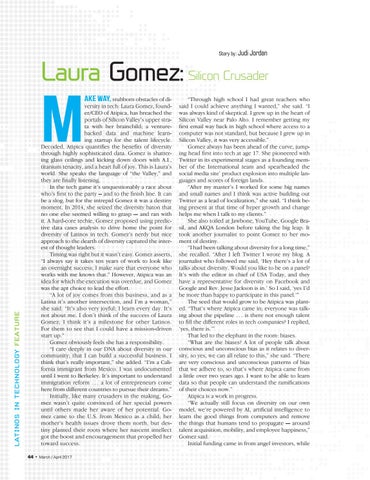Story by: Judi Jordan
Laura Gomez: Silicon Crusader
LATINOS IN TECHNOLOGY FEATURE
M
ake way, stubborn obstacles of di-
versity in tech: Laura Gomez, founder/CEO of Atipica, has breached the portals of Silicon Valley’s upper strata with her brainchild; a venturebacked data and machine learning startup for the talent lifecycle. Decoded, Atipica quantifies the benefits of diversity through highly sophisticated data. Gomez is shattering glass ceilings and kicking down doors with A.I., titanium tenacity, and a heart full of joy. This is Laura’s world. She speaks the language of “the Valley,” and they are finally listening. In the tech game it’s unquestionably a race about who’s first to the party – and to the finish line. It can be a slog, but for the intrepid Gomez it was a destiny moment. In 2014, she seized the diversity baton that no one else seemed willing to grasp — and ran with it. A hard-core techie, Gomez proposed using predictive data cases analysis to drive home the point for diversity of Latinos in tech. Gomez’s nerdy but nice approach to the dearth of diversity captured the interest of thought leaders. Timing was right but it wasn’t easy. Gomez asserts, “I always say it takes ten years of work to look like an overnight success; I make sure that everyone who works with me knows that.” However, Atipica was an idea for which the execution was overdue, and Gomez was the apt choice to lead the effort. “A lot of joy comes from this business, and as a Latina it’s another intersection, and I’m a woman,” she said. “It’s also very joyful; I learn every day. It’s not about me. I don’t think of the success of Laura Gomez; I think it’s a milestone for other Latinos. For them to see that I could have a mission-driven start up.” Gomez obviously feels she has a responsibility. “I care deeply in our DNA about diversity in our community; that I can build a successful business. I think that’s really important,” she added. “I’m a California immigrant from Mexico. I was undocumented until I went to Berkeley. It’s important to understand immigration reform … a lot of entrepreneurs come here from different countries to pursue their dreams.” Initially, like many crusaders in the making, Gomez wasn’t quite convinced of her special powers until others made her aware of her potential. Gomez came to the U.S. from Mexico as a child; her mother’s health issues drove them north, but destiny planted their roots where her nascent intellect got the boost and encouragement that propelled her toward success. 44 • March / April 2017
“Through high school I had great teachers who said I could achieve anything I wanted,” she said. “I was always kind of skeptical. I grew up in the heart of Silicon Valley near Palo Alto. I remember getting my first email way back in high school where access to a computer was not standard, but because I grew up in Silicon Valley, it was very accessible.” Gomez always has been ahead of the curve, jumping head first into tech at age 17. She pioneered with Twitter in its experimental stages as a founding member of the International team and spearheaded the social media site’ product explosion into multiple languages and scores of foreign lands. “After my master’s I worked for some big names and small names and I think was active building out Twitter as a lead of localization,” she said. “I think being present at that time of hyper growth and change helps me when I talk to my clients.” She also toiled at Jawbone, YouTube, Google Brasil, and AKQA London before taking the big leap. It took another journalist to point Gomez to her moment of destiny. “I had been talking about diversity for a long time,” she recalled. “After I left Twitter I wrote my blog. A journalist who followed me said, ‘Hey there’s a lot of talks about diversity. Would you like to be on a panel? It’s with the editor in chief of USA Today, and they have a representative for diversity on Facebook and Google and Rev. Jesse Jackson is in.’ So I said, ‘yes I’d be more than happy to participate in this panel.’” The seed that would grow to be Atipica was planted. “That’s where Atipica came in; everyone was talking about the pipeline … is there not enough talent to fill the different roles in tech companies? I replied, ‘yes, there is.’” That led to the elephant in the room: biases. “What are the biases? A lot of people talk about conscious and unconscious bias as it relates to diversity, so yes, we can all relate to this,” she said. “There are very conscious and unconscious patterns of bias that we adhere to, so that’s where Atipica came from a little over two years ago. I want to be able to learn data so that people can understand the ramifications of their choices now.” Atipica is a work in progress. “We actually still focus on diversity on our own model, we’re powered by AI, artificial intelligence to learn the good things from computers and remove the things that humans tend to propagate — around talent acquisition, mobility, and employee happiness,” Gomez said. Initial funding came in from angel investors, while
